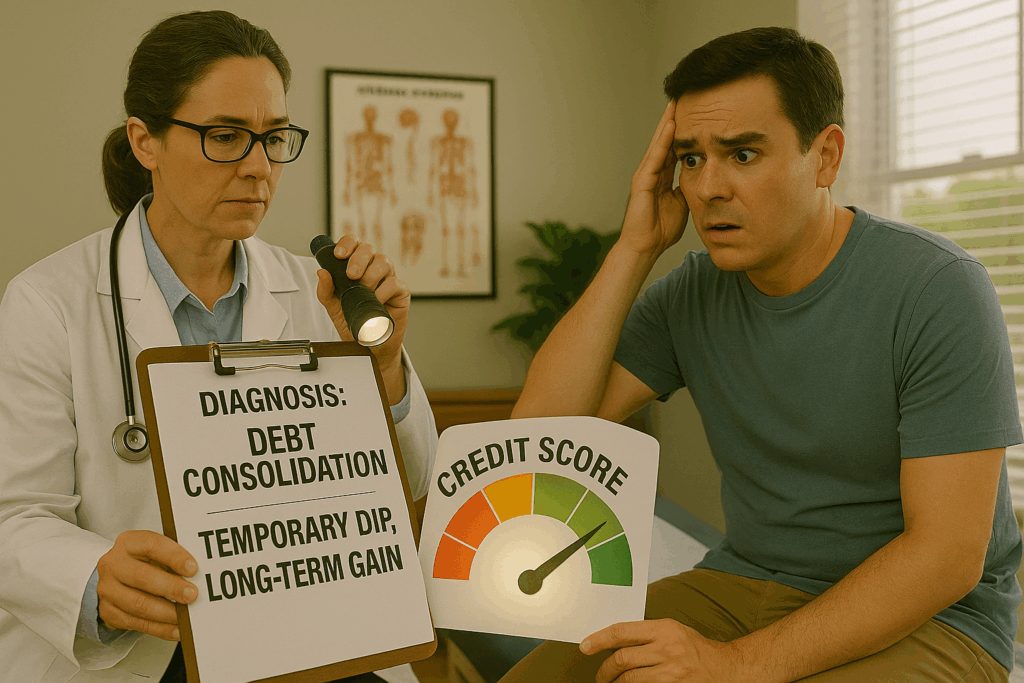Can You Consolidate Debt Without Hurting Your Credit Score?

Debt consolidation can help you manage multiple payments, reduce interest costs, and streamline your finances. However, many people worry about the impact it might have on their credit score. The truth is, while consolidation can cause a temporary dip in your credit, it can also improve your financial standing in the long run.

So, can you consolidate debt without hurting your credit score? The answer depends on how you approach it. Understanding the different consolidation options and their potential effects on your credit can help you make an informed decision.
What Is Debt Consolidation?
Debt consolidation involves using a loan or credit card to pay off multiple debts. The goal is to secure a lower interest rate, simplify payments, and pay off debt faster. While it can be a useful tool, it’s important to pair it with smart budgeting to avoid falling deeper into debt.
Common Debt Consolidation Methods
Each debt consolidation option has advantages and disadvantages. Choosing the right one depends on your financial situation, credit score, and repayment ability.
1. Personal Loans
A personal loan provides a lump sum to pay off existing debts, leaving you with a single monthly payment. These loans often come with fixed interest rates and repayment terms ranging from one to seven years.
Best for: People with good credit who want a structured repayment plan.
Pros:
- Fixed payments make budgeting easier
- May offer lower interest rates than credit cards
- No risk of losing collateral
Cons:
- Not guaranteed to have a lower rate than existing debts
- Some lenders charge origination fees
- Missing payments can hurt your credit
2. Balance Transfer Credit Cards
Balance transfer cards offer a 0% APR introductory period, allowing you to pay off your balance without accruing interest.
Best for: Individuals with good to excellent credit who can pay off their balance within the promo period.
Pros:
- Interest-free payments for up to 21 months
- Potentially faster debt repayment
- No annual fee on many cards
Cons:
- Requires a high credit score for approval
- Balance transfer fees range from 3% to 5%
- High interest kicks in after the intro period
3. Home Equity Loans or HELOCs
Homeowners can use their home’s equity to secure a home equity loan (a lump sum with fixed payments) or a home equity line of credit (HELOC) (a revolving credit line).
Best for: Homeowners with significant equity who qualify for low-interest loans.
Pros:
- Lower interest rates than personal loans or credit cards
- Large borrowing limits if you have substantial equity
- HELOCs may offer interest-only payments initially
Cons:
- Your home is collateral—missed payments could lead to foreclosure
- Closing costs and potential annual fees
- Housing market changes could leave you owing more than your home’s value
Can You Consolidate Debt Without Hurting Your Credit Score?
Debt consolidation affects your credit in several ways. In the short term, it may cause a slight dip in your credit score, but responsible management can lead to long-term improvement. Here’s how consolidation can impact your credit:
Short-Term Effects on Your Credit
- Hard Inquiry on Your Credit Report
Lenders perform a hard credit check when you apply for a loan or credit card, which can temporarily lower your score by a few points. - New Credit Account Lowers Your Credit Age
Opening a new credit account reduces the average age of your accounts, which can slightly impact your score. - Credit Utilization May Fluctuate
A balance transfer can initially increase your utilization rate if the new card’s limit is lower than your existing debts. However, paying down the balance quickly will reverse this effect.
Long-Term Benefits of Debt Consolidation
- On-time payments build positive credit history
- Lower interest rates help you pay off debt faster
- Reducing credit utilization improves your score over time
By managing your consolidation responsibly, you can turn a temporary credit dip into long-term financial health.
How to Consolidate Debt Without Hurting Your Credit
Although you can’t completely avoid credit score changes when consolidating, you can minimize any negative effects by taking the right steps.
1. Keep Old Credit Accounts Open
Closing old credit cards can reduce your available credit, increasing your utilization ratio. Keeping them open can help maintain a strong credit profile.
2. Pay Off Your Debt Quickly
If you use a balance transfer card, aim to pay off your balance before the introductory period ends. This prevents high-interest charges and improves your credit utilization rate.
3. Avoid Applying for Multiple Loans at Once
Each loan application results in a hard inquiry. Too many in a short time can significantly impact your credit score. Choose your best option and apply selectively.
4. Make Every Payment on Time
Your payment history is the most significant factor in your credit score. Set up automatic payments to avoid late fees and score damage.
5. Monitor Your Credit Regularly
Tracking your credit score and report helps you understand how consolidation is affecting your financial health. Free credit monitoring tools can alert you to changes and potential issues.
Bottom Line
Debt consolidation can temporarily lower your credit score, but with careful planning, you can minimize the impact and even improve your financial situation. By choosing the right method, making on-time payments, and keeping an eye on your credit, you can use consolidation as a stepping stone to long-term financial stability.
If you’re considering consolidation, check your credit score before applying and compare your options. With a strategic approach, you can consolidate debt without hurting your credit score and take control of your financial future.
If you ever need expert assistance or guidance on your credit journey, don’t hesitate to reach out to the Nerds! Additionally, stay updated with the latest tips and information by following us on Facebook, Instagram and TikTok!

